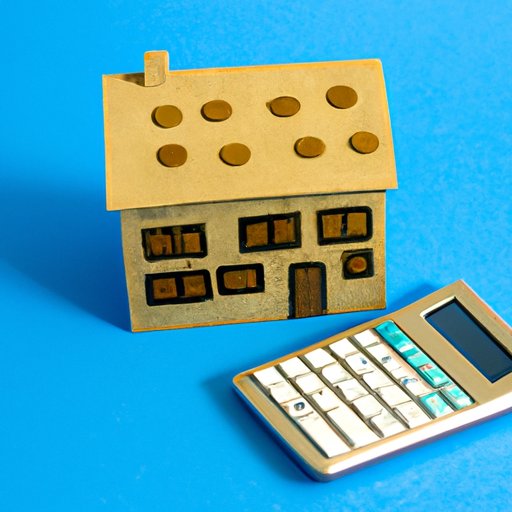
Introduction
Buying a home is a significant investment and decisions shouldn’t be made lightly. It is crucial to determine how much mortgage you can afford before beginning the home buying process. This guide aims to provide a comprehensive understanding of calculating your budget and identifying your ideal mortgage payment plan.
Calculating Your Budget: A Step-by-Step Guide to Determine How Much Mortgage You Can Afford
The 28/36 rule is a widely accepted standard to calculate the maximum amount you can afford to spend on a mortgage payment each month. This rule recommends that your mortgage payment should not exceed 28% of your gross monthly income and all other expenses (including your mortgage payment) should not exceed 36% of your gross monthly income.
To calculate your budget using the 28/36 rule; calculate 28% of your gross monthly income and 36% of your gross monthly income. Deduct all other monthly expenses from 36% of your gross monthly income to get your actual mortgage payment budget.
For instance, if your gross monthly income is $8,000, your monthly mortgage payment should not exceed $2,240 (28% of $8,000). Deducting all other expenses from 36% of your monthly gross income ($2,880) leaves you with $640 to apply towards your housing payment each month.
The Do’s and Don’ts of Estimating Your Mortgage Budget
To get an accurate estimation of your mortgage budget, you should consider all expenses relevant to homeownership, not just the end mortgage payment amount. Be sure to factor in property taxes, homeowners insurance, and other incidental expenses when calculating your budget. Likewise, you should avoid the pitfalls of estimation inaccuracies caused by underestimating or inflating your income projections.
Navigating the Housing Market: Tips to Determine Your Ideal Mortgage Payment
There are three primary mortgage payment options: fixed, variable, and interest-only. When deciding on the ideal mortgage payment plan for your budget, it’s paramount to think about your financial goals and future plans regarding homeownership. Fixed mortgage payment plans offer the peace of mind of predictable payments over time. Variable pricing, on the other hand, gives the advantage of having a lower interest rate. Interest-only options are ideal for individuals with variable income streams.
Crunching the Numbers: How to Assess Your Finances Before Applying for a Mortgage
Before heading out to search for your dream home, you must assess your finances and prepare essential financial documents required for mortgage applications. You will need to have a good credit score, stable and documented income, assets and employment history, and outstanding debt, if any.
Additionally, cleaning up your finances, such as paying off outstanding debts, reducing spendings on your credit cards, and creating a realistic budget, can help you get approved for a mortgage much faster. Good finances can also help you secure more favorable interest rates, which save you thousands of dollars in the long run.
Maximizing Your Home Buying Potential: The Importance of Accurately Estimating Your Mortgage Affordability
Accurately estimating your mortgage affordability offers numerous benefits that increase your home buying potential. If you overestimate your mortgage affordability, you may receive pre-approvals for homes that are out of your price range. Moreover, an overestimation could lead to significant financial distress, which may put your homeownership dream at serious risk. Underestimating your mortgage affordability can limit your home buying options and leave you feeling like you’re settling rather than getting what you want.
The Pitfalls of Overestimating or Underestimating Your Mortgage Affordability: Tips to Get It Right
One of the most significant pitfalls of overestimating your mortgage affordability is the increased risk of foreclosure. Conversely, underestimating your mortgage affordability may limit your housing options, and it robs you of your ability to “shop” for ideal homes. To prevent these significant financial risks associated with estimation inaccuracies, it is vital to work with mortgage professionals who can help you make informed decisions based on your financial situation.
Conclusion
Determining how much mortgage you can afford is about more than just qualifying for a home. It’s about ensuring long-term financial stability, which translates to the successful homeownership of your dreams. Accurately estimating your mortgage affordability can be challenging, but with the assistance of mortgage professionals to build an informed strategy, you can make sound decisions that maximize your home buying potential.




